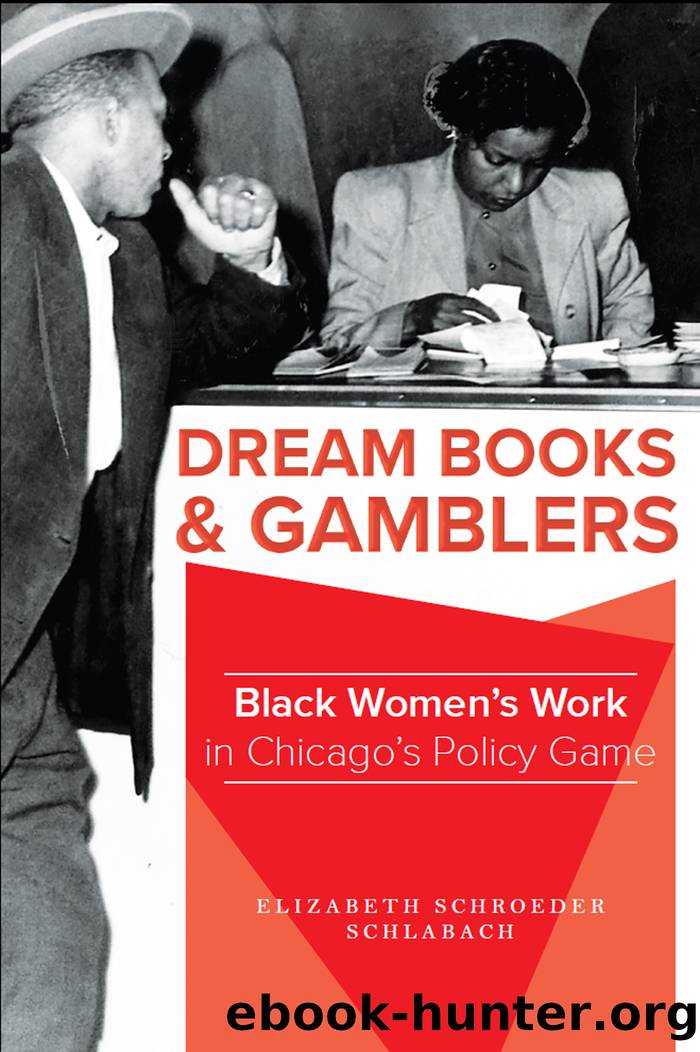Dream Books and Gamblers: Black Women's Work in Chicago's Policy Game by Elizabeth Schroeder Schlabach

Author:Elizabeth Schroeder Schlabach
Language: eng
Format: epub
Tags: HISTORY / Wars & Conflicts / Civil War (U.S.)
Publisher: University of Illinois Press
Published: 2022-09-23T00:00:00+00:00
5 What Arrest Records Reveal
Up until this point, my analysis of Black womenâs labor in the policy gambling industry has focused on the opportunities presented by informal economic labor. Iâve showcased the success stories of Elizabeth Slaughter, Eudora Johnson Binga, Harriett Jones, and several mediums to prove that policyâs conspicuousness was difficult but not impossible to navigate. My analysis has shown that by leveraging their associations with policy gambling, some Black women found innovative ways to keep their respectability intact. But these women are the exceptions to policyâs narrative not the rule. Far more numerous were the women who were constantly harassed by the Chicago police for their lower-level employment in the policy industry and their gambling habits. Also far more numerous are the stories of policy writers and gamblers arrested for policy work and play and then harassed for being âfallenâ or âunrespectableâ women. Their stories provide insight into the racist and sexist ways Chicagoâs white legal structures and Department of Police surveilled Black women policy workers and players. Therefore, the last two chapters of this book present a different type of visibilityâa consuming surveillance that Black women policy workers and gamblers found extremely difficult to survive, yes, but that did not ultimately prevail. Indeed Black women were constrained, but their experiences canât be reduced to those constraints. Black women arrested for policy gambling join a tradition of Black women who, Keeanga Yahmatta Taylor argues, ââmade a way out of no way,â ⦠born from pure defiance and a refusal to do what you are told.â1
Black women thrived despite severe challenges. Because Black womenâs homes and jobs, regardless of their ties to policy gambling or degrees of visibility, did not enjoy the legal protections that white womenâs homes did, Black women had to innovate. Arrest records for policy gambling in Cook County, Illinois, between 1925 and 1968 reveal that Black womenâs spaces of residence and employment were purposefully destabilized by a particularly aggressive police force. Archival data, arrest records, and the Chicago Defender verify that African Americans were the primary targets of police activity in Bronzeville.2 Police arrests and surveillance disrupted African American womenâs authority over their homes, workplaces, marriages, and children. And unlike the ways in which Black women policy workers navigated their conspicuousness in policy gambling, their daily strategies of visibility had to contend with law enforcementâs unrelenting sexist and racially motivated modes of surveillance.
Although policy gambling ran rampant in many urban centers, seldom were white offenders pursued with the same rigor as their Black counterparts.3 Rather than seeking to stop policy gambling, police actions were primarily aimed at the social control of specific racial populations.4 Social control of African American womenâs spaces required establishing and normalizing the association of Black feminine space with vice. Although white womenâs labor in the domestic sphere remained sacrosanct, Black women did not have the same luxury. The effects on Black womenâs lives of labor and leisure were dire. Without legal enforcement and protection of their domestic and working spheres, which
Download
This site does not store any files on its server. We only index and link to content provided by other sites. Please contact the content providers to delete copyright contents if any and email us, we'll remove relevant links or contents immediately.
The Infinite Retina by Robert Scoble Irena Cronin(6249)
Harry Potter and the Cursed Child: The Journey by Harry Potter Theatrical Productions(4507)
The Sports Rules Book by Human Kinetics(4391)
Molly's Game: From Hollywood's Elite to Wall Street's Billionaire Boys Club, My High-Stakes Adventure in the World of Underground Poker by Molly Bloom(3539)
A Knight of the Seven Kingdoms by George R R Martin(3373)
How To by Randall Munroe(3118)
Flowers For Algernon by Daniel Keyes(3112)
Quidditch Through the Ages by J.K. Rowling(3103)
Quidditch Through the Ages by J K Rowling & Kennilworthy Whisp(2971)
Stacked Decks by The Rotenberg Collection(2883)
Quidditch Through the Ages by Kennilworthy Whisp by J.K. Rowling(2860)
Quidditch through the Ages by J. K. Rowling(2795)
776 Stupidest Things Ever Said by Ross Petras(2784)
Quidditch Through The Ages by J. K. Rowling(2768)
Ready Player One: A Novel by Ernest Cline(2724)
What If?: Serious Scientific Answers to Absurd Hypothetical Questions by Randall Munroe(2705)
Beautiful Oblivion by Jamie McGuire(2609)
The Book of Questions: Revised and Updated by Gregory Stock Ph.d(2575)
Champions of Illusion by Susana Martinez-Conde & Stephen Macknik(2453)
